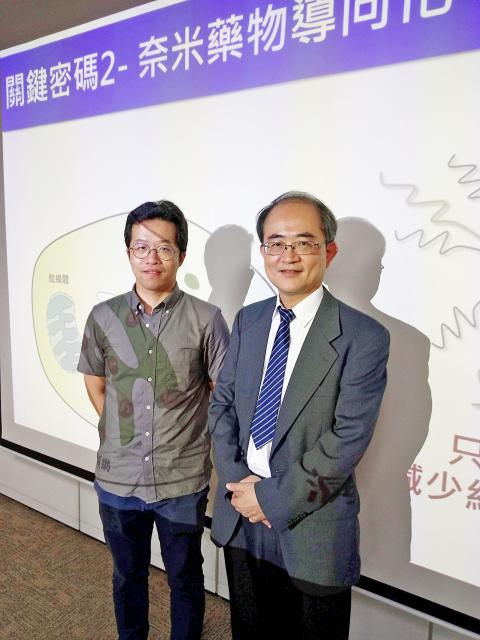A team of National Cheng Kung University (NCKU) researchers has developed a new therapy for a rare childhood immunodeficiency disorder that employs nanotechnology to enhance the use of curcumin as a medication.
Chronic granulomatous disease (CGD) affects nearly one in 200,000 births worldwide, and more than 10 Taiwanese children have the disease, pediatrician Shieh Chi-chang (謝奇璋), a professor of clinical medicine at the Tainan-based university who also works at the National Applied Research Laboratories, told a news conference yesterday at the Ministry of Science and Technology in Taipei.
Children with CGD suffer from repeated infections and could die at an early age, as there is no known cure, he said.

Photo: Wu Liang-yi, Taipei Times
Doctors often prescribe interferons in a bid to prevent more infections or recommend stem cell transplants, he said.
Seeking a more accessible and safer treatment, about six years ago he began researching using curcumin, which is extracted from turmeric roots, Shieh said.
Curcumin’s poor water solubility means it is not readily absorbed by the human body and there have been concerns that it might kill cells other than the targeted ones, he said.
His team eventually developed a method using nanotechnology to wrap curcumin with a more biocompatible material, allowing it to act on target bacteria, he said.
The medication has been tested on mice and he expects to complete clinical testing and commercialization in five years, he said.
He thanked current and former members of the team, including Deputy Minister of Science and Technology Shieh Dar-bin (謝達斌), for their work.
The method could be applied to other diseases with similar pathologies, Shieh Chi-chang told a reporter who asked if developing a cure for one rare disease was worth the effort.
The National Laboratory Animal Center has developed a bacterial artificial chromosome technique that can transfer nearly 200,000 base pairs of human genes into mice, a task few researchers in the world have achieved, center researcher Jiang Si-tse (蔣思澈) added.

MAKING WAVES: China’s maritime militia could become a nontraditional threat in war, clogging up shipping lanes to prevent US or Japanese intervention, a report said About 1,900 Chinese ships flying flags of convenience and fishing vessels that participated in China’s military exercises around Taiwan last month and in January last year have been listed for monitoring, Coast Guard Administration (CGA) Deputy Director-General Hsieh Ching-chin (謝慶欽) said yesterday. Following amendments to the Commercial Port Act (商港法) and the Law of Ships (船舶法) last month, the CGA can designate possible berthing areas or deny ports of call for vessels suspected of loitering around areas where undersea cables can be accessed, Oceans Affairs Council Minister Kuan Bi-ling (管碧玲) said. The list of suspected ships, originally 300, had risen to about

DAREDEVIL: Honnold said it had always been a dream of his to climb Taipei 101, while a Netflix producer said the skyscraper was ‘a real icon of this country’ US climber Alex Honnold yesterday took on Taiwan’s tallest building, becoming the first person to scale Taipei 101 without a rope, harness or safety net. Hundreds of spectators gathered at the base of the 101-story skyscraper to watch Honnold, 40, embark on his daredevil feat, which was also broadcast live on Netflix. Dressed in a red T-shirt and yellow custom-made climbing shoes, Honnold swiftly moved up the southeast face of the glass and steel building. At one point, he stepped onto a platform midway up to wave down at fans and onlookers who were taking photos. People watching from inside

Japan’s strategic alliance with the US would collapse if Tokyo were to turn away from a conflict in Taiwan, Japanese Prime Minister Sanae Takaichi said yesterday, but distanced herself from previous comments that suggested a possible military response in such an event. Takaichi expressed her latest views on a nationally broadcast TV program late on Monday, where an opposition party leader criticized her for igniting tensions with China with the earlier remarks. Ties between Japan and China have sunk to the worst level in years after Takaichi said in November that a hypothetical Chinese attack on Taiwan could bring about a Japanese

The WHO ignored early COVID-19 warnings from Taiwan, US Deputy Secretary of Health and Human Services Jim O’Neill said on Friday, as part of justification for Washington withdrawing from the global health body. US Secretary of State Marco Rubio on Thursday said that the US was pulling out of the UN agency, as it failed to fulfill its responsibilities during the COVID-19 pandemic. The WHO “ignored early COVID warnings from Taiwan in 2019 by pretending Taiwan did not exist, O’Neill wrote on X on Friday, Taiwan time. “It ignored rigorous science and promoted lockdowns.” The US will “continue international coordination on infectious